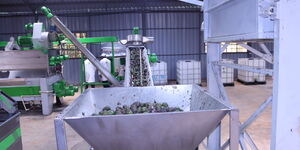Researchers at Meru University of Science and Technology developed a technique for using clay soil to make cement, a strategy they projected will reduce the cost of construction.
The researchers noted that the product will be available in the Kenyan market in 2023 after completing all the necessary procedures.
According to the researchers in an interview with NTV on Saturday, December 17, the construction cost will be reduced by 40 per cent if Kenyans embrace clay-made cement.
"The cost of cement is proportional to the cost of clinker, which is a component of cement manufacturing. This is often imported thus increasing the cost of cement," Joseph Mwiti, the lead researcher, stated.
He added that introducing the product into the Kenyan markets would also reduce the amount of cement imported, noting that it had been perfected for four years through numerous experiments.
"If we are to actualise affordable housing we have to significantly lower the cost of cement. What we have in regions without cement factories is the abundance of clay, we need to capitalise on this to manufacture cement," he remarked.
According to the researchers, most of the clay used was sourced from Nyeri and Meru counties.
"When we start producing cement out of clay, this means we can have cement factories based in every county since they all have clay," Mwiti declared.
Consequently, this will create more jobs for the youth and boost the country's economy.
He added that in January 2023, they will partner with institutions in India to manufacture a pilot plan so that key players in the cement manufacturing industry can adopt the idea.
The Kenya Bureau of Standards (KEBS) also called for talks to discuss how the product will be made available in the market, including the necessary quality checks.
The institution's Vice Chancellor, Simon Thuranira, noted the plan is in line with the global mindset to reduce the effects of climate change.
"We are proud of our innovators. Other than the University of Pretoria no other university has come up with the idea in Africa," he added.
Researchers anticipated partnership with Makerere University in Uganda, the University of Dar es Salaam in Tanzania, the Padova University in Italy, and Uppsala University in Sweden for more research.












